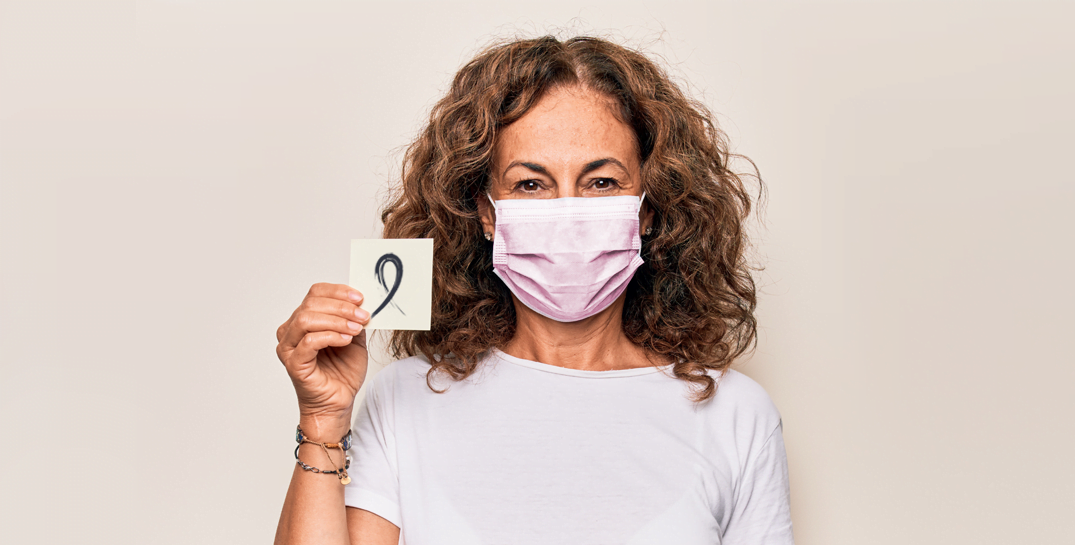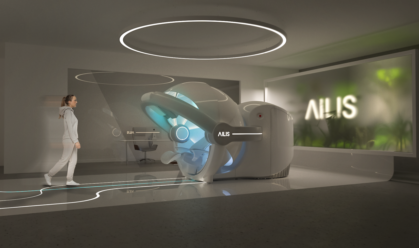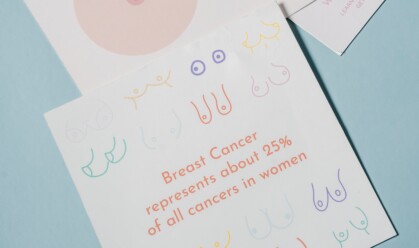Breast cancer and coronavirus (COVID-19)

The coronavirus outbreak has changed our lives. Many of us are worried about the health and safety of ourselves and our loved ones. Meanwhile, medical personnel are trying to cope with the situation and provide care to those who are ill, not just due to coronavirus. We are all aware that this is not an easy task, and those with pre-existing medical conditions are particularly vulnerable to complications of SARS-CoV-2 virus infection. And how is the coronavirus outbreak related to breast cancer?
Diagnostic challenges
One of the first visible consequences of the epidemic was the limited access to medical services. A large proportion of GP consultations is currently done online instead of face-to-face meetings. Some specialist consultations are also provided online or over the phone. In March 2020, the number of consultations with GPs in the UK fell by 30%. In Poland, between March and May 2020, there was a decline in the issuance of green DILO cards (priority cancer treatment cards) of 25% up to 40% according to some sources.
In addition, hospital admissions have been severely reduced and rescheduled.
“There’s something happening right now that’s not being talked about out loud, but we’re actually experiencing – there is a massive number of patients who are desperate, they are traveling sometimes hundreds of kilometers for follow-up treatment, consultation or advice, as appointments in their area are dramatically delayed. They need help, because online consultations are insufficient in their case, and they are waiting in our outpatient clinic, and we can not accept them all.” – says Professor Piotr Wysocki, head of the Oncology Department at the University Hospital in Kraków, in his interview with Polska Times in September 2020.
This state of affairs has caused a reduction in the number of correct diagnoses of breast cancer (as well as many other diseases!) and delays in the implementation of appropriate treatment in many cases. According to data published in the British Journal of Cancer, England saw a 28 percent decrease in referrals related to suspected breast cancer in early 2020 compared to the previous year.
Difficult therapy
Also in the same study, the number of people receiving their first treatment for breast cancer decreased by 16%. However, the number of women receiving hormone therapy as an alternative to surgery increased over time.
Coronavirus also directly affected patients with other cancers. In them, a severe course of infection was more frequently observed. There are several factors that contribute to this.
- Cancer, including breast cancer, is often associated with age. Older people are more likely to have other comorbidities in addition to cancer. Together, these contribute to the increased risk of a more severe course of COVID-19 infection in this group.
- Also, the development of cancer itself is known to weaken one’s body, especially if it is at an advanced stage.
- In addition, treatments used to treat breast cancer, such as chemotherapy, immunotherapy, or targeted therapy, impairs functions of the immune system. This effect may persist for several months after treatment ends. Hence, breast cancer treatment with these methods and the time period shortly afterwards may make us vulnerable to more severe coronavirus disease.
However, it is not clear whether cancer itself, especially early stage cancer, has any impact on the course of COVID-19 infection and whether COVID-19 infection has any effect on cancer development.
One thing is certain – the pandemic has adversely affected many of us, not sparing those struggling with breast cancer diagnosis. During this particular time it is worth taking care of your health the best you can. Protect yourself and those around you from infection, but also do not hesitate to seek medical advice if you are experiencing worrying symptoms, and make decisions about the right treatment with the guidance of specialists.
References:
- “Coronavirus (COVID-19): What People With Breast Cancer Need to Know.” Breastcancer.org, 5 May 2020, www.breastcancer.org/about_us/press_room/news/coronavirus. Accessed 8 Jan. 2021.
- Czupryn, A. (2020). Prof. Piotr Wysocki: Gwałtownie wzrośnie w Polsce śmiertelność chorych z chorobą nowotworową. [online] Polska Times. Available at: https://polskatimes.pl/prof-piotr-wysocki-gwaltownie-wzrosnie-w-polsce-smiertelnosc-chorych-z-choroba-nowotworowa/ar/c1-15174790?fbclid=IwAR25j1B_cXipStO20Rzh0QSSkh_kfmgLFTsa1MYNJTBLm2PbGojdIdOSMRU [Accessed 14 Jan. 2021].
- Gathani, Toral, et al. “The COVID-19 Pandemic and Impact on Breast Cancer Diagnoses: What Happened in England in the First Half of 2020.” British Journal of Cancer, 30 Nov. 2020, pp. 1–3, www.nature.com/articles/s41416-020-01182-z, 10.1038/s41416-020-01182-z. Accessed 11 Jan. 2021.
- “How Might COVID-19 Have Affected People’s Ability to See Their GP?” The Health Foundation, 1 May 2020, www.health.org.uk/news-and-comment/charts-and-infographics/how-might-covid-19-have-affected-peoples-ability-to-see-GP. Accessed 11 Jan. 2021
- Marklowska-Tomar, M. (2020). Wzrośnie liczba zachorowań i zgonów z powodu raka w krajach UE. [online] cowzdrowiu.pl. Available at: https://cowzdrowiu.pl/aktualnosci/post/wzrosnie-liczba-zachorowan-i-zgonow-z-powodu-raka-w-krajach-ue?fbclid=IwAR1DgFnzAgE6gOnAqRlTArH0sRrTG63TtxPuSkRj99hOszgKSEK4BlzVesI [Accessed 14 Jan. 2021].
- “Special Report: COVID-19’s Impact on Breast Cancer Care.” Breastcancer.org, 17 Dec. 2020, www.breastcancer.org/treatment/covid-19-and-breast-cancer-care. Accessed 8 Jan. 2021.


